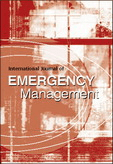
International Journal of Emergency Management
Scope & Guideline
Connecting scholars and practitioners to tackle critical emergency challenges.
Introduction
Aims and Scopes
- Disaster Preparedness and Response:
Research related to strategies and methodologies for preparing for and responding to various emergencies, including natural disasters, pandemics, and technological hazards. - Technological Innovations in Emergency Management:
Exploration of new technologies and communication systems that improve emergency management practices, such as social media analysis, real-time data collection, and communication systems. - Institutional and Organizational Capacity:
Studies focusing on the effectiveness of institutional frameworks, resource allocation, and communication within organizations involved in emergency management. - Community Resilience and Engagement:
Investigating the role of communities in emergency management, including how community networks can enhance resilience and preparedness. - Climate Change and Environmental Impacts:
Research addressing the implications of climate change on emergency management practices, including disaster risk reduction and adaptation strategies. - Crisis Management and Coordination:
Examining the dynamics of crisis management, including inter-agency collaboration, leadership, and coordination during emergencies.
Trending and Emerging
- Cybersecurity in Emergency Management:
A rising concern regarding the intersection of cybersecurity and emergency management, particularly in the context of field hospitals and emergency response systems, highlighting the need for robust defenses against cyber threats. - Climate Change Adaptation Strategies:
An increasing emphasis on understanding and integrating climate change impacts into emergency management practices, showcasing the urgency of adapting strategies to address environmental challenges. - Social Media and Real-Time Data Utilization:
The use of social media for real-time situational awareness and communication during emergencies is gaining traction, reflecting the importance of technology in enhancing response efforts. - Inter-Organizational Collaboration:
A trend towards exploring collaborative frameworks among various organizations during emergencies, emphasizing the need for coordinated efforts to improve outcomes. - Community Engagement and Resilience Building:
A growing focus on the role of community engagement in building resilience, indicating a shift towards more inclusive and participatory approaches in emergency management.
Declining or Waning
- Historical Analyses of Past Disasters:
There has been a noticeable decrease in studies focusing on historical reviews of past disaster management practices, suggesting a shift towards more contemporary and forward-looking approaches. - Individual Psychological Responses to Disasters:
Research on individual psychological impacts and responses during emergencies has become less frequent, indicating a possible waning interest in this area compared to broader organizational and systemic studies. - Traditional Emergency Management Frameworks:
The focus on conventional emergency management frameworks and protocols appears to be diminishing, as newer methodologies and interdisciplinary approaches gain traction.
Similar Journals

International Journal of Disaster Risk Science
Fostering collaboration for effective disaster response strategies.The International Journal of Disaster Risk Science, with ISSN 2095-0055 and E-ISSN 2192-6395, is a premier, peer-reviewed open-access journal published by Springer. Since its inception in 2011, the journal has been dedicated to advancing knowledge and practice in the field of disaster risk science, facilitating critical discussions around disaster preparedness, response, and resilience across various regions of the globe. This journal holds impressive rankings, including Q1 in Geography, Planning and Development, and Q1 in Safety Research for 2023, confirming its high impact within the academic community. With converged publication years from 2010 to 2024 and being ranked in the top 10% in multiple categories, it serves as an essential resource for researchers, professionals, and students alike. As an open-access journal, it ensures that cutting-edge research is freely available, promoting wider dissemination and engagement with topical issues in disaster risk management.

BMC EMERGENCY MEDICINE
Transforming emergency medicine through innovative research.BMC Emergency Medicine is a premier, open-access journal that has been at the forefront of the field of emergency medicine since its inception in 2001. Published by BMC in the United Kingdom, this journal is distinguished by its impact factor and remarkable Q1 ranking in emergency medicine, placing it among the top-tier publications in this vital area of healthcare. With a current Scopus rank of #30 out of 109 in the category of Emergency Medicine, and occupying the 72nd percentile, BMC Emergency Medicine is a leading platform for researchers and practitioners alike to disseminate their findings related to urgent and critical care. The journal embraces a broad scope within emergency medicine, encouraging submissions on a wide range of topics including clinical practice, innovative techniques, public health, and policy issues that critically affect emergency care. The open-access model ensures that high-quality research is readily available to the global community, fostering collaboration and advancing knowledge in the field. For those dedicated to improving patient outcomes in emergency settings, BMC Emergency Medicine represents an invaluable resource and community.

Risk Hazards & Crisis in Public Policy
Fostering dialogue on the forefront of risk management.Risk Hazards & Crisis in Public Policy is a leading academic journal published by WILEY, focusing on the interdisciplinary study of risks and crises as they pertain to public policy. Since its inception in 2010, this journal has established itself prominently in the field, currently holding a Q2 quartile ranking in Public Administration and boasting an impressive Scopus percentile of 89, ranking it 24 out of 232 journals in its category. This demonstrates its significant influence and relevance among peer-reviewed publications. The journal serves as a critical platform for researchers, policymakers, and practitioners to share innovative research, insightful analyses, and practical solutions related to the management and mitigation of risks in public administration. Although it does not currently offer open access options, it continues to provide vital insights into burgeoning issues within the domain, making it an essential resource for anyone interested in advancing their understanding of risk management in public policy contexts.
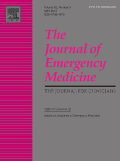
JOURNAL OF EMERGENCY MEDICINE
Driving excellence in emergency medical scholarship.The JOURNAL OF EMERGENCY MEDICINE, published by Elsevier Science Inc, is a premier peer-reviewed journal dedicated to advancing the field of emergency medicine. Since its inception in 1983, this journal has served as an essential resource for researchers, clinicians, and students, contributing significantly to evidence-based practices and innovations in the emergency medical landscape. With an impressive ranking of 43 out of 109 in the field of Emergency Medicine according to Scopus, and a current impact factor placing it in the Q2 quartile, this publication is recognized for its rigorous scholarly content and relevance in tackling contemporary issues in emergency care. Although it does not offer open access, the journal remains widely respected for its contribution to the global emergency medicine community, fostering new ideas and discussions that drive the field forward. For those seeking to stay at the forefront of emergency medical research, the JOURNAL OF EMERGENCY MEDICINE is an invaluable addition to your academic endeavors.
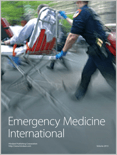
Emergency Medicine International
Elevating standards in emergency medicine through open access.Emergency Medicine International is a distinguished journal dedicated to the dynamic field of emergency medicine, published by HINDAWI LTD. As an Open Access journal since 2010, it ensures widespread dissemination of high-quality research, providing vital insights and advancements in emergency care and crisis intervention methodologies. With an ISSN of 2090-2840 and an E-ISSN of 2090-2859, the journal is indexed in Scopus, where it holds a commendable rank of #104 of 109 in the emergency medicine category, placing it in the 5th percentile. Spanning crucial years from 2014 to 2017 and 2022 to 2024, Emergency Medicine International has established a reputation for publishing significant findings that aid practitioners and researchers in improving emergency healthcare outcomes. Operating from its headquarters in Egypt, the journal serves as an essential resource for professionals and students alike, fostering the development of evidence-based practice in a critical area of healthcare.

Prehospital and Disaster Medicine
Pioneering Research in Prehospital CarePrehospital and Disaster Medicine is a leading peer-reviewed journal published by Cambridge University Press that targets the ever-evolving fields of emergency medicine and disaster management. With an ISSN of 1049-023X and an E-ISSN of 1945-1938, this journal has established its significance within the academic community since its inception, with coverage extending from 1985 to the present. It is widely recognized within its category as evidenced by its 2023 rankings, which position it in the Q2 quartile for both Emergency Medicine and Emergency Nursing. The journal boasts impressive Scopus rankings, standing at Rank #7/32 in Emergency Nursing and Rank #31/109 in Emergency Medicine, demonstrating its relevance and impact in these critical areas. Although it does not offer Open Access, Prehospital and Disaster Medicine is committed to disseminating vital research and innovative practices that address prehospital care, disaster response, and the intersection of these fields, serving as an essential resource for researchers, professionals, and students alike.

Journal of Safety Science and Resilience
Empowering professionals through cutting-edge safety insights.Welcome to the Journal of Safety Science and Resilience, a pioneering platform dedicated to advancing knowledge in the fields of safety, risk, reliability, and quality. Published by KEAI PUBLISHING LTD and based in China, this Open Access journal has made significant strides since its inception in 2020. With an impressive impact factor and a distinguished Q1 ranking in various categories, including Safety Research and Safety, Risk, Reliability and Quality, it serves as an authoritative resource for researchers, professionals, and students alike. The journal's commitment to disseminating high-quality research is reflected in its exceptional Scopus rankings, with top positions in decision sciences and social sciences. As we converge into the future with volumes planned up to 2024, engaging contributions focused on contemporary challenges and innovations in safety science are more essential than ever. Explore groundbreaking studies and elevate your understanding of resilience in the face of uncertainty through this invaluable academic resource.
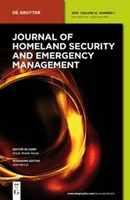
Journal of Homeland Security and Emergency Management
Innovating Strategies for Safer CommunitiesJournal of Homeland Security and Emergency Management, published by Walter de Gruyter GmbH in Germany, is a leading platform for scholarly research dedicated to the critical fields of security and emergency management. With an impressive impact factor reflecting its high-quality publications, this journal plays an essential role in advancing knowledge within its scope that covers vital issues such as disaster preparedness, risk assessment, and organizational resilience. The journal's Scopus rankings highlight its distinguished standing, being in the top quartile for Safety Research and demonstrating significant impact across various fields including Business Management and Safety, Risk, Reliability, and Quality. Researchers, professionals, and students alike can access a wealth of information as this open-access journal from 2004 to 2024 is committed to disseminating critical insights and innovative practices essential for effective homeland security and emergency management strategies.
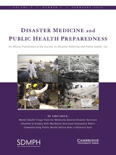
Disaster Medicine and Public Health Preparedness
Fostering excellence in public health preparedness.Disaster Medicine and Public Health Preparedness is a pivotal journal published by Cambridge University Press, dedicated to advancing the field of disaster medicine and public health. With an ISSN of 1935-7893 and an E-ISSN of 1938-744X, this journal holds a commendable place in the academic discourse, featuring a 2023 Scopus ranking of #221 out of 665 in the category of Public Health, Environmental and Occupational Health, placing it in the 66th percentile. It enjoys a Q2 quartile ranking, which underscores its significant contributions to the field. The journal, spanning from 2007 to 2024, serves as a critical platform for researchers, professionals, and students aiming to share innovative findings and best practices in preparing for and responding to public health emergencies. Though not available as Open Access, its rigorous peer-review process ensures high-quality publications that are relevant in addressing contemporary challenges in disaster preparedness. Operating out of the UK, specifically from Edinburgh Building, Shaftesbury Rd, Cambridge, this journal plays an integral role in policy formulation and educational efforts in public health, making it an essential resource for scholars intending to impact the sector meaningfully.

Acute Medicine & Surgery
Pioneering research for the future of emergency and surgical medicine.Acute Medicine & Surgery is a notable peer-reviewed journal published by WILEY, focusing on the dynamic intersection of acute medicine and surgical practice. With an ISSN of 2052-8817, this open-access journal has been committed to disseminating high-quality research since its transition to open access in 2017. Aimed at an audience comprising researchers, clinicians, and students in the medical field, it facilitates broader access to innovative studies that enhance understanding and practice within acute care settings. The journal covers a wide range of topics, including emergency medicine, trauma care, critical analysis of surgical techniques, and best practices in clinical management. By providing a platform for cutting-edge research and case studies, Acute Medicine & Surgery plays a pivotal role in improving patient outcomes and advancing the field of acute healthcare.